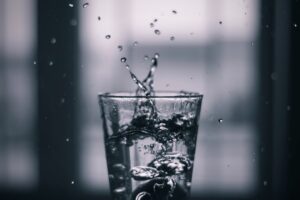A Guide To Proper Hydration
Most of the health experts recommend 8 ounces glass of water a day that is commonly known
as ‘8 x 8’ rule.
Your body is about 90 percent of water. It constantly loses water throughout the day, mostly
through urine and sweat but also from regular body functions like breathing. To prevent
dehydration, you need to get plenty of water from drink and food every day.
There are many different opinions on just how much water you should be drinking every day to stay hydrated.
However, some experts believe that you need to sip on water constantly throughout the day,
even when you’re not thirsty.
As with most things, this depends on the individual. Many factors (both internal and external)
ultimately affect how much water you need.
This article takes a look at some water intake studies to separate fact from fiction and explains
how to easily stay well hydrated for your individual needs.
How Much Water Do We Need?
How much water you need depends on a lot of things and varies from person to person. For
adults, the general recommendation from The U.S. National Academies of Sciences,
Engineering, and Medicine is about:
11.5 cups (2.7 liters) a day for women
15.5 cups (3.7 liters) a day for men
This includes fluids from water, beverages like teas and juice, and from food. You get an
average of 20 percent of your water from the foods you eat.
You might need more water than someone else. How much water you need also depends on:
- Where you live. You will need more water in hot, humid, or dry areas. You’ll also need more water if you live in the mountains or at a high altitude.
- Your diet. If you drink a lot of coffee and other caffeinated beverages you might lose more water through extra urination. You will likely also need to drink more water if your diet is high in salty, spicy, or sugary foods. Or, more water is necessary if you don’t eat a lot of hydrating foods that are high in water like fresh or cooked fruits and vegetables.
- The temperature or season. You may need more water in warmer months than cooler ones due to perspiration.
- Your environment. If you spend more time outdoors in the sun or hot temperatures or in a heated room, you might feel thirstier faster.
- How active you are. If you are active during the day or walk or stand a lot, you’ll need more water than someone who’s sitting at a desk. If you exercise or do any intense activity, you will need to drink more to cover water loss.
Your health. If you have an infection or a fever, or if you lose fluids through vomiting or
diarrhea, you will need to drink more water. If you have a health condition like diabetes
you will also need more water.
Pregnant or breastfeeding. If you’re pregnant or nursing your baby, you’ll need to drink
extra water to stay hydrated. Your body is doing the work for two (or more), after all.
Does the Water Intake Affect Energy Level?
Many people claim that if you don’t stay hydrated throughout the day, your energy levels and
brain function start to suffer.
There are plenty of studies to support this one study in women showed that a fluid loss of 1.36 percent after exercise impaired mood and concentration and increased the frequency of headaches.
Another study in China that followed 12 men in university found that not drinking water for 36
hours had noticeable effects on fatigue, attention and focus, reaction speed, and short-term
memory.
Even mild dehydration can reduce physical performance. A clinical study on older, healthy men reported that just a 1 percent loss of body water reduced their muscle strength, power, and endurance.
At the end of the day, no one can tell you exactly how much water you need. This depends on
many factors. Try experimenting to see what works best for you. Some people may function
better with more water than usual, while for others it only results in more frequent trips to the
bathroom.
If you want to keep things simple, these guidelines should apply to the majority of people:
1. Drink often enough throughout the day for clear, pale urine.
2. When you’re thirsty, drink.
3. During high heat and exercise and other mentioned indications, make sure to drink
enough to compensate for the lost or extra needed fluids.
4. That’s it!
